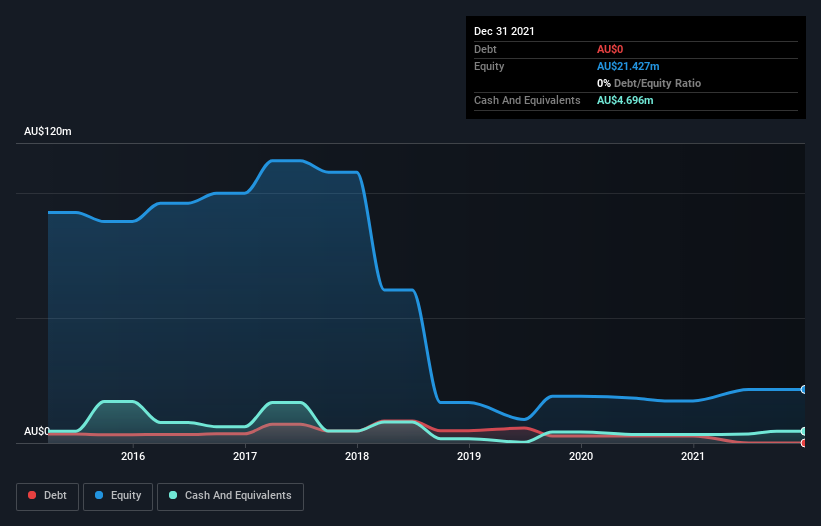- Australia
- /
- Renewable Energy
- /
- ASX:CCE
Carnegie Clean Energy (ASX:CCE) Is In A Strong Position To Grow Its Business
Just because a business does not make any money, does not mean that the stock will go down. For example, although software-as-a-service business Salesforce.com lost money for years while it grew recurring revenue, if you held shares since 2005, you'd have done very well indeed. But while history lauds those rare successes, those that fail are often forgotten; who remembers Pets.com?
So should Carnegie Clean Energy (ASX:CCE) shareholders be worried about its cash burn? For the purpose of this article, we'll define cash burn as the amount of cash the company is spending each year to fund its growth (also called its negative free cash flow). First, we'll determine its cash runway by comparing its cash burn with its cash reserves.
See our latest analysis for Carnegie Clean Energy
When Might Carnegie Clean Energy Run Out Of Money?
A company's cash runway is the amount of time it would take to burn through its cash reserves at its current cash burn rate. When Carnegie Clean Energy last reported its balance sheet in December 2021, it had zero debt and cash worth AU$4.7m. Looking at the last year, the company burnt through AU$565k. That means it had a cash runway of about 8.3 years as of December 2021. While this is only one measure of its cash burn situation, it certainly gives us the impression that holders have nothing to worry about. The image below shows how its cash balance has been changing over the last few years.

How Hard Would It Be For Carnegie Clean Energy To Raise More Cash For Growth?
Issuing new shares, or taking on debt, are the most common ways for a listed company to raise more money for its business. Commonly, a business will sell new shares in itself to raise cash and drive growth. We can compare a company's cash burn to its market capitalisation to get a sense for how many new shares a company would have to issue to fund one year's operations.
Carnegie Clean Energy has a market capitalisation of AU$30m and burnt through AU$565k last year, which is 1.9% of the company's market value. So it could almost certainly just borrow a little to fund another year's growth, or else easily raise the cash by issuing a few shares.
Is Carnegie Clean Energy's Cash Burn A Worry?
Because Carnegie Clean Energy is an early stage company, we don't have a great deal of data on which to form an opinion of its cash burn. However, it is fair to say that its cash runway gave us comfort. Summing up, its cash burn doesn't bother us and we're excited to see what kind of growth it can achieve with its current cash hoard. Taking a deeper dive, we've spotted 4 warning signs for Carnegie Clean Energy you should be aware of, and 1 of them is a bit unpleasant.
If you would prefer to check out another company with better fundamentals, then do not miss this free list of interesting companies, that have HIGH return on equity and low debt or this list of stocks which are all forecast to grow.
New: AI Stock Screener & Alerts
Our new AI Stock Screener scans the market every day to uncover opportunities.
• Dividend Powerhouses (3%+ Yield)
• Undervalued Small Caps with Insider Buying
• High growth Tech and AI Companies
Or build your own from over 50 metrics.
Have feedback on this article? Concerned about the content? Get in touch with us directly. Alternatively, email editorial-team (at) simplywallst.com.
This article by Simply Wall St is general in nature. We provide commentary based on historical data and analyst forecasts only using an unbiased methodology and our articles are not intended to be financial advice. It does not constitute a recommendation to buy or sell any stock, and does not take account of your objectives, or your financial situation. We aim to bring you long-term focused analysis driven by fundamental data. Note that our analysis may not factor in the latest price-sensitive company announcements or qualitative material. Simply Wall St has no position in any stocks mentioned.
About ASX:CCE
Carnegie Clean Energy
Engages in the development of the CETO Wave Energy Technology, a submerged point absorber type wave energy converter which converts ocean waves into zero-emission electricity internationally.
Adequate balance sheet with slight risk.
Market Insights
Community Narratives



